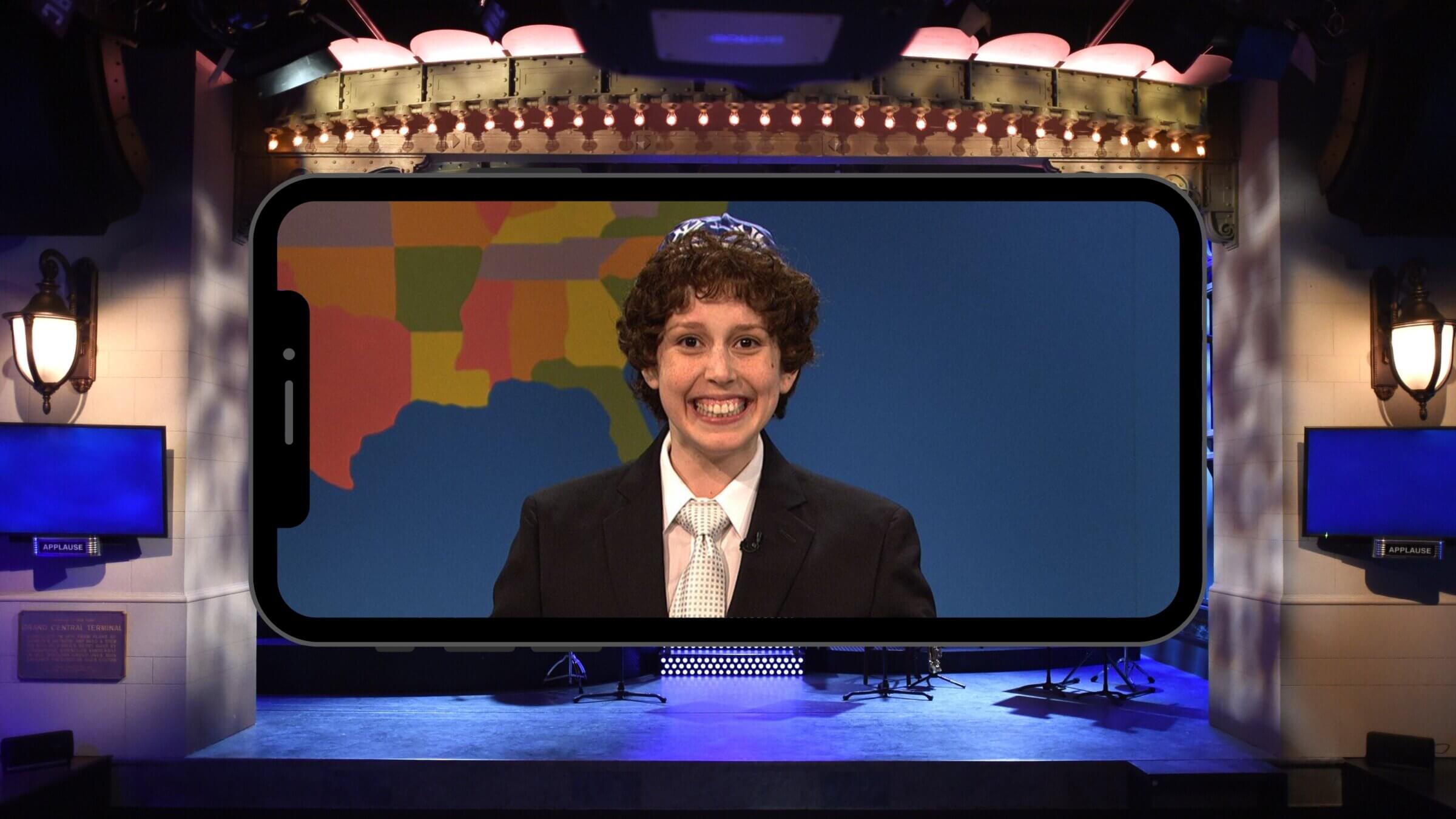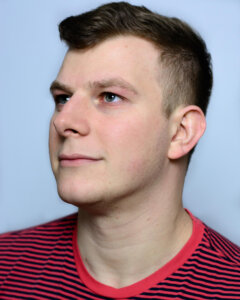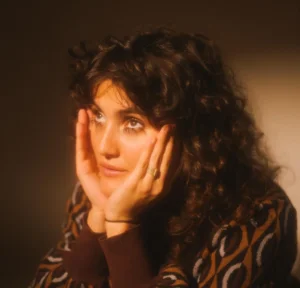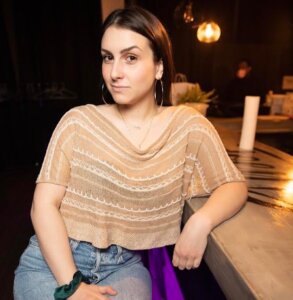8 young Jewish comedians on what ‘SNL 50’ means to them
‘Saturday Night Live’ may be entering middle age, but these rising Jewish comics are just getting started.

Vanessa Bayer’s “Jacob the Bar Mitzvah Boy” is one of many ‘SNL’ moments that have influenced this rising generation of Jewish comedians. Graphic by TIMOTHY A. CLARY/AFP via Getty Images / NBC Studios / Canva / Samuel Eli Shepherd
Saturday Night Live, or SNL, premieres the first episode of its 50th season this weekend. Like a lot of New York City exports – bagels, Barbie, Broadway – it’s a product with deep Jewish roots.
Lorne Michaels, SNL’s creator and visionary, was born Lorne Lipowitz and was bar mitzvahed at a synagogue in Toronto. Many of the greatest comics to emerge from SNL’s early days, such as Gilda Radner, Laraine Newman or Alan Zweibel, were also all proud Jews.
But half a century in, how’s SNL holding up with Jewish comedians in the TikTok generation?
Ahead of Saturday night’s chag, I spoke to seven of the brightest Jewish comics working in New York City today, all under 35 years old. They entered the industry when SNL was competing with streaming services and social media platforms for the love and laughter of today’s audiences.
Here’s what these late millennial and Gen Z artists had to say about how SNL influenced their comedic coming of age, and what they see as some of the show’s most iconic Jewish moments.
The (other) Jewish Sabbath
“It was a real ritual for me,” said Jacob Kaplan, 25 who started watching SNL “religiously” starting in the fifth grade.

“I especially remember that post-Weekend Update period that runs about 12:30 to 1,” Kaplan said. “This specific memory of being in my living room, feeling this very personal connection to the show, especially the back half of the show, which people usually talk about and watch less.”
Kaplan grew up in D.C. and later moved to New York for college. He found internet fame during the pandemic for producing vertical videos on X and TikTok. He also interned at SNL in 2019, where he later went on to work as a writer’s assistant.
Kaplan said that SNL informed his love for hyper-specific, situational comedy. It’s the type of niche humor that shows up in videos like “hip cantor at a reform synagogue who also doesn’t believe in science” or “14-year-old in a play acting out experiences he’s clearly never had.”
“I think ‘Jacob the Bar-Mitzvah Boy’ is a big Jewish SNL moment for me,” Kaplan said, referring to to Vanessa Bayer’s recurring Weekend Update sketch. Bayer plays a pubescent Jewish boy who refuses to deviate from his D’var Torah script.
“You don’t have to have known this type of kid or been that type of kid or been to a bar mitzvah to find it funny,” Kaplan said. “But if you do know that world, there’s an extra level of depth to that.”
“Wrecking ball” comedy

Comedian Kyle Gordon, 31 is perhaps most well-known for his 2023 music video “Planet of the Bass.” Originally a TikTok parody of 90s European dance music, the ironically catchy song has amassed over 5 million views on YouTube, and it even inspired a real life album.
Like his friend and collaborator Jacob Kaplan, Gordon is known for using TikTok to showcase screwball characters. He mentioned how watching DVD videos of SNL alumnus Chris Farley inspired his love for loud, boisterous characters that take up all the attention in the room.
“He was always a wrecking ball to everything in the scene,” Gordon said. “A lot of what I do now is inspired by him.”
Gordon admitted he had never actually seen a live episode of SNL – just DVDs and uploaded clips online – but he still had a favorite “implicitly Jewish” moment. He loved Andy Samberg’s character “Ras Trent,” a white, upper-class Ivy League student who embraces Rastafarianism. The skit spoofs privileged kids who adopt the aesthetics of marginalized communities.
“It reads as Jewish,” Gordon said. “I knew a thousand of those kids at camp,” he said. (Plus…I mean…it’s Andy Samberg.)
Giving the cold open the cold shoulder

Not every Jewish comedian I spoke to held SNL as the pinnacle of comedy. In fact, some saw SNL as corporate, or simply uncool.
Take stand-up comedian Gabby Jordan Brown, 30. Brown said she has a lot of respect for the people who work at SNL, but it’s not always her preferred kind of humor.
“I think sometimes, to me, if comedy seems too industry, I don’t like it,” said Brown. “I have a hard time with any kind of comedy that doesn’t seem inherently a little punk rock.”
Still, she pointed to outlandish Jewish performers like Rachel Dratch, who brought a “weird and punk rock” energy to sketches that could otherwise seem too by-the-book.
“Honestly, I think I’m pretty unhirable at SNL!” Brown joked. “I would go on and say things like, ‘who thinks Jewish bisexuals are the scourge of the earth?’ And then I would get kicked off the stage.” (I’d watch!)
Watching SNL through osmosis
Ariel Elias, 35 is another standup comedian with a flair for dark humor. She went viral a few years ago for a classy confrontation with a pro-Trump heckler. Growing up in Kentucky, she said she was not even allowed to watch SNL, as her parents were strict about bedtime.

Elias said that she instead consumed standup specials and films by Jewish comedians like Mel Brooks, which informed her childhood comedy tastes.
Still, with such a strong grasp on American culture, Elias conceded that SNL “leaks into everything else,” including her southern Jewish community.
“I remember my friend from my youth group, we were coming home from a camping trip and he let me have one of his headphones,” Elias said. “And he was listening to Adam Sandler’s album.”
“So that stuff permeated for sure, much more than the actual sketches themselves,” Elias said. She performed Sandler’s famous ‘Hanukkah Song’ at her youth group talent show later that year.
Practicing before their prime (time)

Another Sandler-fan-turned-comedian, Marcus Lustig, 27, sang a parody of the “Hanukkah Song” at his high school’s Passover assembly every year.
Lustig, who today both performs and works as a producer in the industry, said that performing his Sandler spoof in high school gave him the confidence to eventually pursue comedy full-time.
“How lucky I am that I got to grow up in a place where I was like, ‘Can I sing a funny song for this?’” Lustig said. “And the adults in charge were like, ‘Sure!’”
Taking notes on Long Island

SNL also played a key role in the childhood of Rose Kelso, 27. One time, after a stressful day in which she learnt her father lost her job, she overheard her parents laughing downstairs in her Long Island living room.
“I walked downstairs and they’re watching SNL,” Kelso said. “ I sat down there and I watched with them and it made everything feel normal.” She teared up. “And I was like, well, that’s simply what I have to do.”
Kelso’s work focuses on (oftentimes raunchy) musical comedy, such as a viral music video about having sex with European men to get revenge on Nazis. She got her start watching SNL, where skits like Andy Samberg’s Jewish Willy Wonka informed her odd (and deeply Jewish) sense of humor.
“I’d watch those sketches back over and really write out what was funny,” Kelso said. She collected the jokes on index cards she used to keep in her room. “Then I’d go to school the next day and try to recite the lines in my own way in a conversation.”
Ladies who laugh

Similar to Kelso, standup comedian Molly Kornfeld, 31 shared how watching SNL as a kid influenced her love for weird humor. She pointed to the famous sketch of Kristen Wiig as Liza Minelli trying to turn off a lamp as one of her all-time favorite sketches.
Kornfeld, who is partially Jewish, is also the daughter of two standup comedians. She mentioned how she grew up with her parents reminiscing about SNL’s Golden Age. Her mother in particular loved Jewish SNL alumnus Gilda Radner.
“Seeing a woman on TV being funny and silly was inspirational to my mom because there wasn’t like a place for that,” said Kornfeld of the late Jewish SNL legend.
The zany kid in us all

Standup comedian and TikTok star Lukas Arnold, 29 also found inspiration in SNL‘s wackiness. Watching digital shorts by The Lonely Island in middle school introduced him to iconic weekly segments like Weekend Update, which influenced his style of snappy one-liners.
Arnold, whose father’s side of the family is Jewish, said he saw himself in Jonah Hill’s character Adam Grossman. In a series of sketches set at Benihana, Hill plays a six-year-old boy who speaks more like a 60-year-old Borscht Belt comedian than a child.
“It’s this energy that cannot, for the life of him, be quiet or tune into the acceptable behavior that would make everyone else’s night go smoothly,” Arnold explained. “This zany character. That was something I definitely identified with and remember wanting to embody.”
Live from New York?
Most of the Jewish comedians I spoke to said they would not be watching the premiere live on Saturday night. Some comedians said they’ll be performing standup, or wrapping on film sets. Others said they just didn’t have cable or a friend’s Peacock subscription to mooch off of.
But almost all said they plan to watch clips of the episode on YouTube, Instagram and TikTok Sunday morning.
















